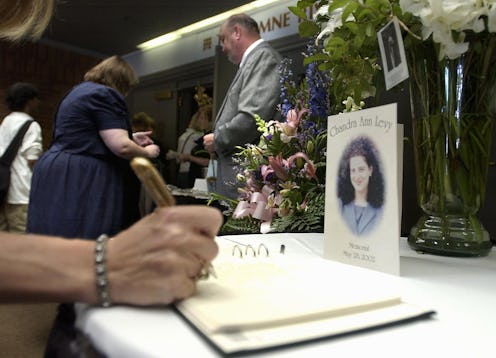News
Convicted Chandra Levy Killer Will Get New Trial
Prosecutors in the case of murdered federal intern Chandra Levy on Friday gave up a five-year battle against defense attorneys for her convicted killer, Ingmar Guandique. The defense had argued in the years following Guandique's conviction that key testimony by their client's former prison cell-mate had been misleading and had resulted in a panel of jurors sentencing him to 60 years in prison. This week, U.S. attorneys said that they would not block attempts by Guandique's attorneys to petition for a new trial in an attempt to clear his name.
Guandique had previously been convicted in 2002 for attacking two female joggers in the same vicinity where Levy's remains were discovered. Prosecutors argued that Guandique had a history of violence against women that matched the M.O. of Levy's killer. Paired with damning testimony from inmate Armando Morales, a convicted drug dealer and gang member who shared a cell with Guandique in 2006, the jury easily convicted. Now, Guandique's lawyers alleged that they had discovered evidence which indicated Morales had made up his story to curry favor with the prosecution.
In a statement on Friday, acting U.S. attorney Vincent Cohen and assistant U.S. attorney Leslie Ann Gerardo defended the initial conviction and requested that the Superior Court of the D.C. Criminal Division hold a timely status hearing in two weeks to determine whether or not Guandique would be allowed a second trial.
"We remain firm in our conviction that the jury's verdict was correct and are preparing for a new trial to ensure that Guandique is held accountable," they said, casting suspicion on the defense's premise that Morales had lied in his testimony. They continued:
The government continues to believe that the jury’s verdict was correct. The government also believes that nothing in the thousands of pages of information that have been produced about Mr. Morales and the USAO-DC’s prosecution of the defendant, nor anything else revealed by the government’s comprehensive post-trial investigation, casts doubt on the defendant’s guilt of the murder of Chandra Levy.
Chandra Levy had been working as a paid federal intern at the Federal Bureau of Prisons in Washington, D.C. in 2001 when she disappeared in May of that year following a troubling phone call from her parents who claimed that had not heard from her in five days. Initial search efforts were ruled unsuccessful.
Nearly a year later in May 2002, D.C. Metropolitan Police announced to the public that they had uncovered skeletal remains matching Levy's dental records in the vicinity of Rock Creek Park in the Northern D.C. area. Further examination confirmed that the remains belonged to Levy.
In a shocking twist of events, police later revealed that Levy had been having an affair with married California Congressman Gary Condit, a Democrat who was 30 years her senior. When confronted about the affair and possible murder connection, Condit vehemently denied his involvement and later sued Vanity Fair investigative reporter Dominick Dunne for $11 million in 2005 for inferring that Condit knew more than he was telling. They later settled out of court.
Condit's connection to the puzzling case, no matter how vague, may have hurt his re-election bid in 2002 which was unsuccessful, but he was never formally charged and later fell out of the spotlight altogether. After Guandique's conviction in 2010, it was assumed that the case was closed.
On Friday, defenders lobbying for Guandique challenged that.
"The government’s case against Ingmar Guandique was based on a lie," said defense attorney Jon Anderson in a statement. "We are gratified that the government has now acknowledged that it cannot defend this conviction, and we look forward to justice being served in a new trial."
The Chandra Levy case has troubled many in the years since Guandique's conviction, namely because of the prosecution's lack of forensic evidence linking him to Levy's death. Internet logs that may have provided additional evidence were also accidentally corrupted when an investigator untrained in computer tech attempted to search her history.
In a 2010 court report, Newsweek called the Levy case a "shocking series of blunders by the police", alleging that both the media and police were culpable in their softball treatment of Condit. There was also an embarrassing span of nearly 13 months between Levy's disappearance and the open discovery of remains by a jogger taking his dog on a walk, allowing the elements to completely wipe her bones of all forensic data that would have told investigators how, exactly, she had died.
If Guandique's lawyers are granted a second trial, there is no doubt that they will dredge all of this to the surface. But for Levy's mother, who maintains to this day that even she can't be sure whether Guandique actually committed the murder, a second trial won't change anything.
"I've always had questions," Susan Levy told the Associated Press in a phone interview. "[But] it's not going to make a difference for me, because my daughter’s dead."
Images: Getty Images (3)
